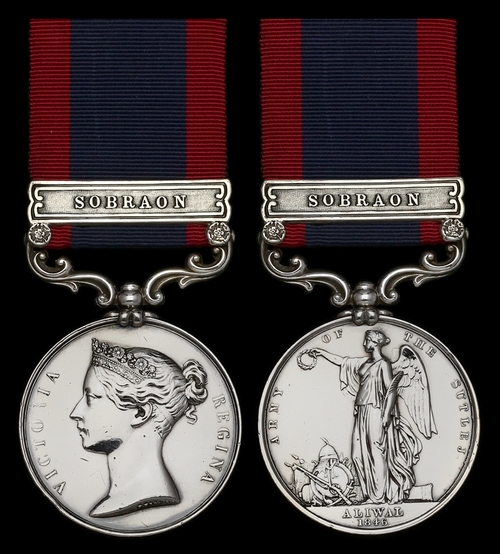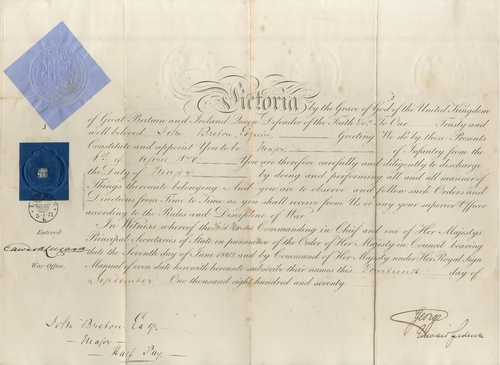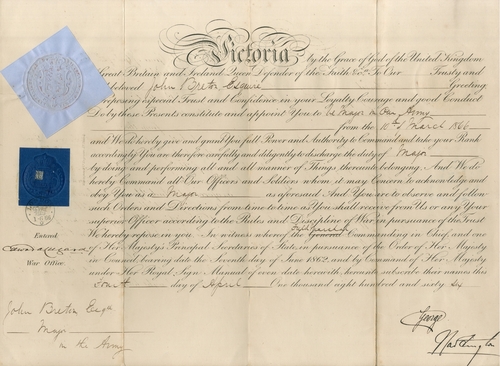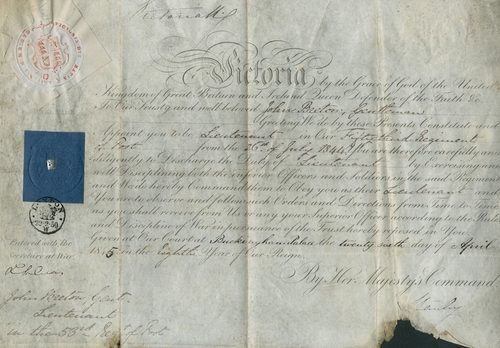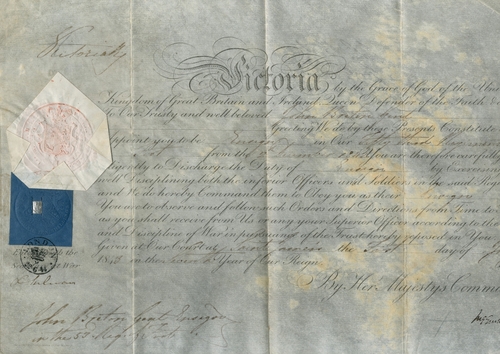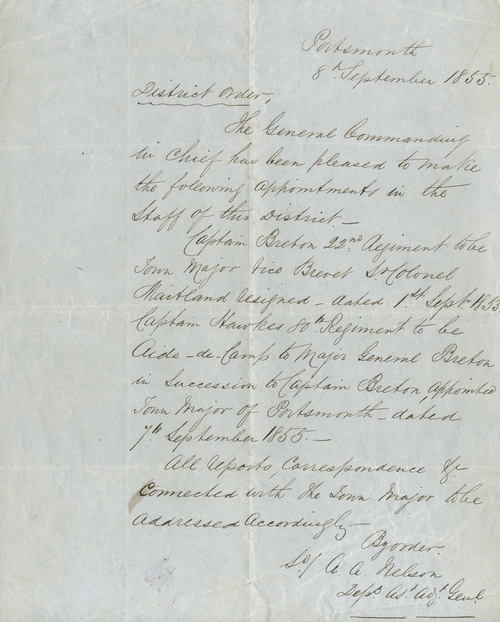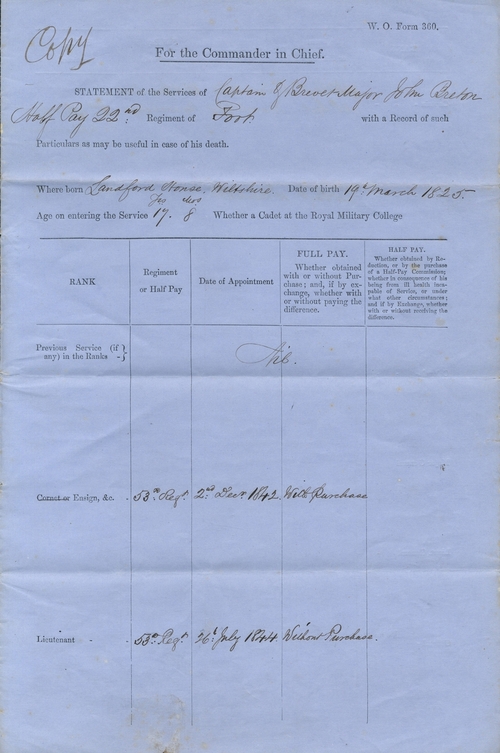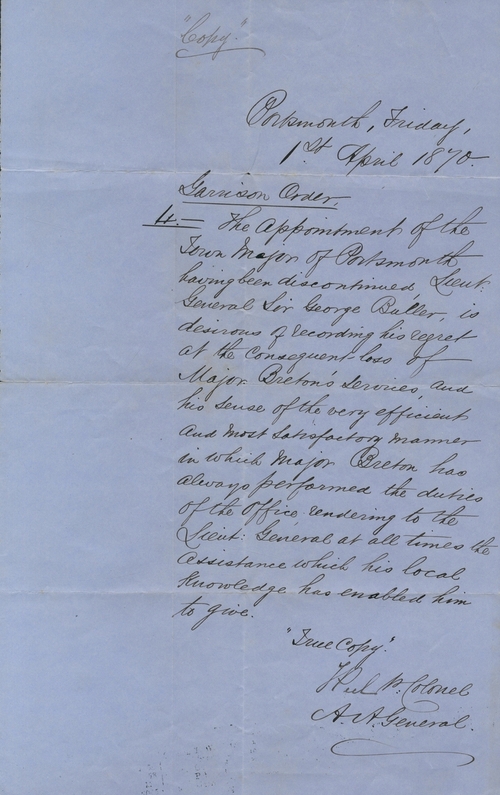Auction: 25002 - Orders, Decorations and Medals
Lot: 73
The Sutlej Medal awarded to Major J. Breton, 53rd Regiment of Foot, who was wounded in action at the Battle of the Sobraon
Sutlej 1845-46, reverse for Aliwal 1846, 1 clasp, Sobraon (Lieut John Breton 53rd Regt), sold together with original documents of commission, edge bruise, light contact marks, nearly very fine
Provenance:
Glendining's, September 1993, when sold with his father's Waterloo medal.
John Breton was born at Landford Manor House, Wiltshire on 19 March 1825, the son of John and Elizabeth Breton. His father had served as a Lieutenant in the Royal Artillery and was with Mercer's troop at the Battle of Waterloo, having three horses shot from under him during the Battle. Commissioned Ensign with the 53rd Foot on 2 December 1842, Breton joined them in Scotland where they were largely involved in aiding the civil power in the event of unrest although they did also provide a Guard for Queen Victoria on her first visit to the country. The Regiment was posted to Ireland the next year and there Breton was advanced Lieutenant on 25 July 1844.
Posted to India on 18 December 1844 they were headquartered in Cawnpore in 1845 but marched to join the British army facing off against the Khalsa, arriving in 1846. They saw action for the first time at Buddewall on 21 January 1846, a small skirmish however just a week later the Battalion went into action again at Ailwal. Despite the exceptionally heavy fire of the well trained Sikh infantry, the 53rd performed very well. Sir Harry Smith said of them at the Battle 'H.M.s 53rd a young regiment, but veterans in daring gallantry and regularity'.
At the Battle of Sobraon on 10 February they were to see heavy fighting as a part of General Dick's Division on the left of the British line. The Soldiers of Shropshire Museum Website gives further detail stating:
'The 53rd Foot were now part of the 7th Brigade commanded by Brigadier Stacey, which was part of the 3rd Division commanded by Major-General Sir Robert Dick. The British and Bengali army of about 15,000 men was under the command of Major-General Sir Hugh Gough.
On the 10th February, the 53rd Foot was under arms at 4.00 a.m. and marched into previously arranged positions prior to a general assault on the Sikh lines.
The 53rd and the 10th Foot, with some Indian regiments, were to serve as the vanguard of the attack. The 53rd took the extreme left of the line and lay under cover in a dry stream bed for two hours whilst the British artillery bombarded the Sikh entrenchments.
The order was then given for the left division to advance, which it did in double time, but though it came under very heavy fire, it was not halted until about two hundred yards from the Sikh line when enemy cavalry threatened the left of the 53rd.
A heavy and well-directed fire of musketry (and grape-shot from a nearby British battery) scattered the Sikh cavalry and the 53rd was able to surge forward with a cheer and clear the entrenchments of their Sikh defenders.
The 53rd was the first regiment to close with the Sikhs, but suffered some casualties from Sikh artillery. Captain Warren, the senior Captain, was killed and the Colours took a heavy beating, with the two pike-staffs being broken and men around them shot down. Lieutenant Lucas, carrying one of the Colours, was severely wounded.
However, the enemy's right wing having been turned, the Sikhs retreated into the river along their whole line, being fired upon for close on an hour by the entire British force lining the Sutlej.'
Breton was seriously wounded during the fighting, his service papers note he was 'wounded by a gunshot, on the Loin'. Despite the severity of this injury he survived and returned to Britian on 7 February 1850, being advanced Captain there on 7 February 1850. Transferred to the 22nd Foot on 7 July 1854, he was appointed to the Stagg as A.D.C. at Portsmouth and made Town Major of Portsmouth in September of that year. Officially promoted Major on 10 March 1866 he held the role until it was abolished in 1870, consequently he went onto half-pay on 1 April 1870.
Breton retired in 1872 and died in East Cosham on 30 November 1873, he is buried at the Highland Road Cemetery, Portsmouth; sold together with copied research as well as original research comprising:
i)
Documents of commission for the ranks of Ensign, Lieutenant, Major and Major on half-pay.
ii)
Two original letters confirming the recipient's appointment to and removal from the position of Town Major of Portsmouth.
iii)
The recipient's original discharge documents.
Subject to 20% VAT on Buyer’s Premium. For more information please view Terms and Conditions for Buyers.
Sold for
£850
Starting price
£240

